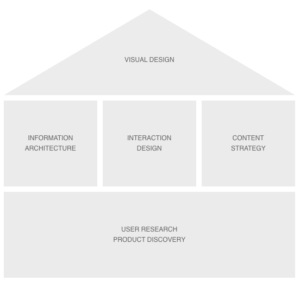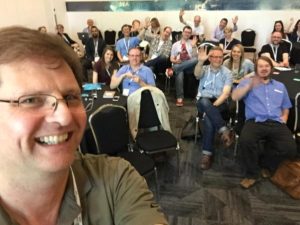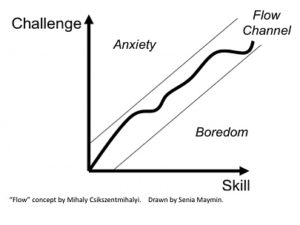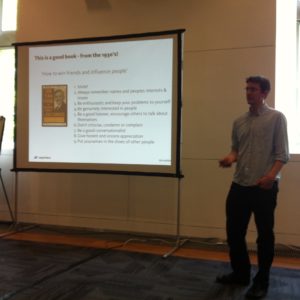UX Scotland 2015 conference write up
In early June, the UX Scotland conference was held for the third time in Edinburgh. I was there once again, this time joined by a newer member of the LTW team – Jonah McLachlan. In this post we highlight what for us were the best sessions, and link to some of the resources now available.
First up, Jonah, who is a one year placement student working in the LTW Web Interfaces team. I’ll follow on from Jonah’s write up with some thoughts of my own…
Jonah McLachlan’s experiences

Scott Logic’s steps for User Experience Design. A helpful session for creating simple systems from complex information.
When asked how the conference was by colleagues I replied that the conference was like ‘drinking from a fire-hose.’ I’ve just come back from UXScotland 2015 which was a beautiful cocktail of practical how-to lectures and in-depth sessions on how to run a team, understand micro-interactions and improve design. Because of the variety of talks, it also drew a range of professionals, from researchers to UI designers, all of whom were great to connect with.
I was really privileged to attend this year. I thoroughly enjoyed networking and getting a better understanding of how User Experience (UX) applies to every area of the workplace. Since I’m just a junior, I simply went to lap up all the new information and enjoyed connecting with a huge selection of like-minded professionals who believe that User Experience is important because people are important.
I was energised by the practical talks given by Dan Saffer, Graham Odds and James Chudley respectively. The subjects included tips on staying productive, being a good leader and also how to approach a situation with very complex users and information and make sense of it. I found these talks extremely helpful, with great take-away principles.
Creativity
In order “to be creative, you have to spend more time with the problem.” This quote from Dan Saffer was accompanied by a very helpful graph about productivity. Demonstrating the contrast between challenging work and being skilled.
Leadership
Helpful soundbites resonated from the breakout session such as “The managers job is to plan, organise and co-ordinate. The leaders job is to inspire & motivate.” and “People are at their most effective when they’re doing what they love. Therefore discover people’s passion. Bring your passions to the table. Make them do the things they love. It’s a no brainer since they’ll be happier and better working. How can you bring what you love into your day job?” All really helpful tips on good leadership with some good books to put in your amazon cart.
Complex information
“You need to mute visual design, and focus on the content. Don’t have a busy noisy screen. Make sure your design is simple: almost black and white, with a stark colour to stand out. “ This is really good advice from Graham Odds, who spoke about understanding complex information and users.
Applying this in our division
With regards to how this all applies to my team, in the Web Interfaces team in the Learning, Teaching and the Web Division, I think that as a team, we can all learn that User Experience doesn’t just apply to the designers. But UX needs to be embraced by the whole team. In an educational environment it’s our role to ensure that Student Experience is our highest priority. As a team we can make efforts to do effective feedback sessions and embrace good leadership, striving for creativity, and aiming for excellence in all our services.
I was really privileged to attend and am inspired to better my work in User Experience. I am certainly looking forward to next year’s conference.
About Jonah
Jonah McLachlan is a one year placement student working in the LTW Web Interfaces team. His role is to assist his team in Drupal development and MyEd service management. He also has a growing interest in UI design and Student Experience (UX).
Neil’s UX Scotland highlights
Once again, this was an excellent conference attracting quality speakers and facilitators from around the world. We really are lucky to have this happening on our doorstep, and it was great once again to see so many colleagues from higher education and the wider public sector attending.
User Experience is such a broad discipline; Jonah and I have very different skills and experiences so my highlights are different to his, but I think this just goes to show the breadth of what was on offer over the two days.
The sessions that really stood out for me were:
- Effective design reviews: how to give and receive meaningful, actionable design feedback
- Lean UX & agile working in a large financial organisation
- Facilitating killer workshops (without hurting yourself in the process)
Effective design reviews

Attendees at Everett McKay’s talk on design reviews. That’s me in the front row. (Image: Twitter @UXDesignEdge)
Everett McKay explained how many design reviews are ineffective, primarily because they aren’t focused on user scenarios but instead focus on visual details and personal opinion, and tend to get off track with defending, debating, and redesigning. He presented his fundamentals of effective design reviews, providing solutions to many design review problems, and gave an overview some design review techniques.
I wouldn’t say the ideas that Everett talked through were entirely new to me, as the idea of priming your customer with likely user scenarios prior to sharing the fruits of your work is something we’ve done for a long time at the UWP when developing websites for business units in the University. But this talk was coming from the perspective of creative design, rather than content development and information architecture.
Effective Design Reviews by Everett McKay – slides on Slideshare
Everett McKay’s design review rules (Word doc)
Lean UX & agile
In this case study by Claire Barnett from Standard Life I spent a lot of time reflecting on how our own agile development project for EdWeb had been going; where we’d had successes in integrating UX processes and where we could have done better.
I was somewhat jealous of the level of culture change happening at Standard Life and the high level sponsorship of the projects and teams Claire worked on, but came away with a lot of inspiration for future projects and hopes for what we might get from the new working spaces IS will be moving to in future. Little things like shared working space, team stability, physical artifacts and wallspace seem like minor details, but an the fast-paced, ever-shifting agile development environment they make a lot of difference.
Claire talked about the perception of the UX practitioner’s role and the mistrust of the UX function which is a common theme in development. UX is everyone’s responsibility. The UX lead isn’t there to say what is or isn’t usable; rather they should be empowering every team member to engage with end users and make more informed decisions. This is so right, and why over the years I’ve focused on spreading the message about the importance of UX and hopefully empowering colleagues across the University to undertake their own work.
Killer workshops
This was a very fluid and entertaining session which Darci Dutcher ran essentially as a workshop to both share her experiences and demonstrate what a great workshop facilitator she is. She took us through a process of identifying problems, issues and questions the group had about running workshops, then got us to collectively prioritise them. And from here, she spent the rest of the session addressing the top topics that the group had identified.
Most importantly, she taught me a lesson about post-it notes that everyone needs to know:
- If post-it notes don’t curl, they stay on the wall better. They curl because of the way we remove them from the pack.
- Pull post-it notes off the pack from the side, or straight down in a swift motion to keep them straight.
- That’s it!
And a couple of websites full of games and activities to facilitate collaboration and consensus and get you away from the usual meeting structure:
Gamestorming – the website of the excellent book of the same name
Tasty Cupcake – a new one on me, seems to be more focused on agile development
In conclusion
Another great conference, and one that I would recommend to colleagues across the University who are involved in the development and management of interactive services. There’s plenty here to learn and inspire for both the beginner and the experienced UX practitioner.
The key things coming out loud and clear (this year and in previous years):
- User experience is everyone’s responsibility – it’s a team thing, not a just a role for one person.
- Real progress in UX enhancement requires culture change within an organisation and sponsorship at the highest levels, otherwise you’re likely to be just tinkering around the edges.
- Encourage interaction – between project team members, involving sponsors, engaging end users. Less talking and more doing!




